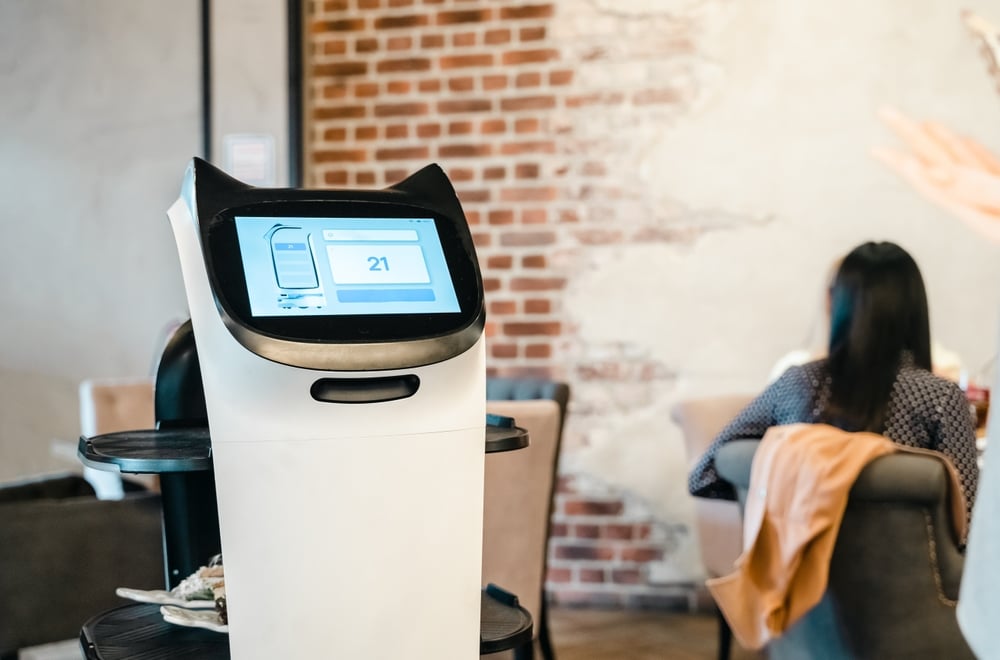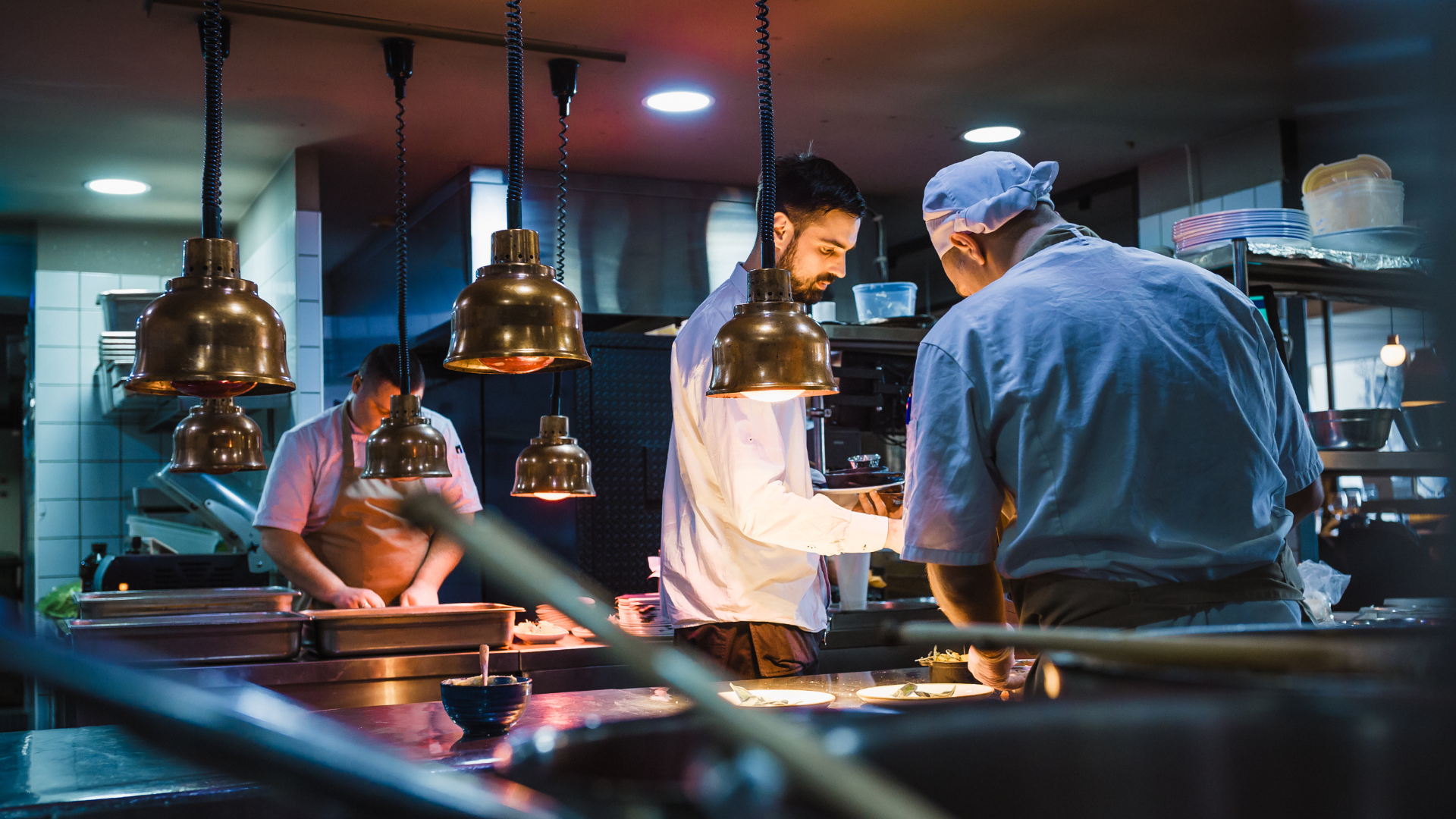Restaurant managers have one job but wear many hats. While a restaurant can’t operate without its team, that team can’t be successful without the right leader.
Restaurant manager duties cover all areas of the business, from daily operations to planning and business reporting. They also manage stock and maintain relationships with customers, staff, and suppliers. Acting as the main point of contact for the restaurant owner, they work both behind the scenes and in a customer-facing role.
Because a restaurant manager's role is so multifaceted, it’s not always clear what you should focus on to succeed. In this guide, we’ll break down the essential duties and skills every restaurant manager needs to run a high-performing, profitable venue.
- Hospitality Leadership
- Using Technology to Optimise Operations
- Managing Financial Budgets & Monitoring Costs
- Maintaining Financial Records & Reports
- Hiring & Training Staff
- Rostering Staff
- Handling Employee Issues & Conflicts
- Ensuring Customer Satisfaction & Building Customer Relationships
- Planning Menus, Pricing & Maintaining Food Quality
- Managing Inventory & Ordering Supplies
- Maintaining Environmental, Food Safety & Sanitation Practices
- Marketing Your Venue
1. Hospitality Leadership
The role of a restaurant manager is to lead a hospitality venue. Managers must ensure it runs smoothly, stays profitable and delivers consistent customer satisfaction. They are responsible for driving company culture, setting service expectations and overseeing daily operations.
To succeed, restaurant managers need a mix of hard and soft skills. They must juggle competing priorities, motivate staff and find creative ways to increase revenue while staying ahead of the competition. Strong financial, marketing, supply chain and employee management skills are essential.
Effective managers also lead by example. They help build a positive workplace culture and coach staff members to maintain high customer service standards. To take operations to the next level, restaurant managers must continuously optimise policies and procedures. This is because speed and cost control are critical to long-term success.
2. Using Technology to Optimise Operations
Modern restaurant managers are constantly juggling tasks to keep operations running smoothly. From labour shortages to rising food costs, the pressure to do more with less is growing. That’s why it’s crucial to improve efficiency and streamlining operations with technology.
Digital tools simplify daily processes and provide valuable insights into customer preferences and business performance. For example, ResDiary's restaurant reservation system includes features like reservation management, real-time table management and automated booking confirmations. This allows you to reduce no-shows and improve overall service quality.
ResDiary is also an excellent tool to collect and analyse data. From customer booking data to point-of-sale (POS) data from an integrated system, you’ll have the information you need to make the right decisions for your business. You can even use our analytics suite to make the most of your data.
ResDiary can also function across multiple locations, allowing you to compare performance across locations. You can even cross-sell your locations if a customer’s preferred booking time isn’t available at one location.
Another example of technology that can help you thrive as a manager is Trail. This digital checklist app allows restaurant managers to maintain consistent operational standards. Tasks like food safety checks, cleaning schedules and shift handovers can be assigned and tracked across teams.
This supports compliance with health and safety regulations and ensures a restaurant’s most important procedures run like clockwork.
Other systems, such as inventory management software (IMS) and POS technology, also play an essential role. IMS helps managers monitor stock levels in real time, reducing food waste and ensuring key ingredients are always available.
POS systems streamline order-taking, reduce errors and improve turnaround times. This supports high customer service standards and a better experience for both staff and diners. You can integrate ResDiary with software like PowerEPOS to maximise the potential of both tools.
By adopting the right mix of tools, restaurant managers can better manage customer demand and reduce operational strain. This allows you to create a more profitable business.
3. Managing Financial Budgets & Monitoring Costs
Restaurant managers require commercial awareness and acute financial management skills. They work closely with the restaurant owner to forecast financial budgets, set periodic sales targets and manage profit and loss (P&L) statements. This includes:
- Managing payroll and approving staff timesheets.
- Sending invoices and ensuring supplier payments.
- Maintaining sufficient cash flow for daily operations.
Good restaurant managers also play a hands-on role in managing finances daily. You’ll need to reconcile daily transactions after each shift, or delegate cash management to a trusted staff member. Keeping labour costs under control while maintaining service quality is a constant balancing act.
Having strong organisational skills and access to real-time financial data is essential for making informed, cost-effective decisions and controlling costs across your business.
4. Maintaining Financial Records & Reports
Making money is vital to hospitality management and running a restaurant business. Part of the duties and responsibilities of a restaurant manager is to report on business performance. This includes identifying areas for improvement and opportunities for growth.
This involves maintaining relevant financial records for business and tax needs. You should also track KPIs like daily sales, average spend per customer and food costs.
Using a reservation system for restaurants, such as ResDiary, allows managers to pull detailed financial reports that highlight trends over time. By identifying patterns in revenue and customer behaviour, you can make data-driven decisions that drive profitability.
5. Hiring & Training Staff
Hiring and training staff members is one of the most important responsibilities of a restaurant manager. The strength of the team directly affects daily operations, service quality and customer satisfaction. This means finding the right people and setting them up for success is essential.
Restaurant managers are responsible for recruiting, onboarding and developing team members across every area of the business, including:
- Front of house (FOH): Host, maitre d'/head waiter, waiters/servers, sommelier, bar staff, runner and busser.
- Back of house (BOH): Head chef, executive chef, sous chef, kitchen manager and dishwasher.
- Restaurant operations team: Assistant restaurant manager, cleaning staff and other support roles.
After hiring and onboarding new employees, staff training becomes a key focus. Managers must communicate each role’s responsibilities and provide training aligned with the restaurant’s service standards.
You should aim to create a supportive work environment that promotes development and accountability. Managers also lead performance reviews, identify areas for improvement and promote team members who demonstrate excellence.
Well-trained teams not only uphold high service standards but also contribute to smoother restaurant operations, stronger workplace culture and more repeat customers.
6. Rostering Staff
A restaurant has many moving parts, and effective staff scheduling is crucial to the success of daily operations. Restaurant managers must ensure the venue is properly staffed to meet customer demand while keeping labour costs within budget.
Creating a fair, flexible roster means:
- Considering employee availability and agreed working hours.
- Matching team members to roles based on experience and strengths.
- Allowing for staff leave, shift swaps or last-minute absences.
- Using rostering and reservation systems to predict peak periods.
Strong organisational skills, understanding of front and back of house tasks, and adaptability are essential for ensuring staffing needs are met during peak hours. Smart rostering tools and reservation systems like ResDiary help to predict busy periods and allocate the right resources.
7. Handling Employee Issues & Conflicts
Restaurant manager responsibilities also include managing people and resolving issues. Whether it’s a miscommunication between kitchen staff or a disagreement on the floor, effective managers must intervene early to keep operations running smoothly.
Creating a positive workplace culture helps reduce turnover, maintain morale and support high service standards. Managers should encourage open communication, take concerns seriously and ensure all staff members feel respected and supported. Handling conflict constructively shows leadership and contributes to a supportive work environment.
8. Ensuring Customer Satisfaction & Building Customer Relationships
Delivering excellent customer service is at the heart of every successful restaurant. A good restaurant manager should have a front of house presence.
This involves listening to guest feedback, resolving complaints, and ensuring everyone leaves satisfied. Diners should feel that as the restaurant manager, you have a handle on service and take care to ensure that they have a great experience.
From seamless online bookings to in-venue experiences, managers are responsible for setting high service standards across all touchpoints.
Tools like nollie, an AI-powered customer relationship management (CRM) platform, help restaurants better understand their diners. You can easily segment your customers based on their preferences and behaviours. This allows you to personalise service at scale.
nollie integrates with ResDiary, enabling you to put the customer data you collect to good use. nollie also enables you to use AI to create effective marketing campaigns to keep customers coming back for more.
Building relationships with regulars boosts customer loyalty, repeat business and word-of-mouth marketing. A calm, empathetic approach and the ability to resolve customer complaints are essential restaurant manager skills.
9. Planning Menus, Pricing & Maintaining Food Quality
Restaurant managers generally don’t cook, but they are pivotal in shaping a restaurant’s menu. Working closely with the head chef, they define the concept, ensure pricing aligns with margins and guide the use of seasonal ingredients.
They develop a menu pricing strategy that considers supply costs, food waste, and portion control, while meeting customer expectations. Regularly reviewing menu performance and sourcing feedback helps refine offerings and maintain food quality.
The right menu helps venues survive and stand out in a competitive restaurant industry.
10. Managing Inventory & Ordering Supplies
Inventory management is a critical part of the restaurant manager's job. Managers or kitchen leads must ensure the venue is stocked with the necessary ingredients, beverages and equipment to meet demand without over-ordering.
Core inventory responsibilities include:
- Monitoring usage and stock levels across FOH and BOH.
- Using digital inventory tools to reduce waste and manage food costs.
- Placing timely supplier orders and tracking delivery timelines.
- Keeping records to identify theft, spoilage or overstocking.
Maintaining consistent deliveries and accurate stock levels supports smooth restaurant operations and helps control operational costs.
11. Maintaining Environmental, Food Safety & Sanitation Practices
Meeting safety regulations is a core responsibility for any strong restaurant manager. You must ensure your venue complies with local health and safety regulations and hospitality certifications. This includes food safety protocols, cleanliness and managing pest control or maintenance issues.
Digital tools like Trail help maintain these standards daily. Managers can assign tasks such as fridge temperature checks, cleaning logs, or fire safety inspections, and monitor task completion across shifts.
By prioritising health and safety regulations, restaurant managers protect guests, avoid fines, and safeguard the restaurant’s reputation for exceptional service. With reliable digital tools like Trail, you can help ensure that regulatory violations don’t have a negative impact on your business or your customers.
12. Marketing Your Venue
A good restaurant manager must take ownership of their restaurant’s marketing. As a manager, you must help define the restaurant's mission statement, ensure consistent branding and support promotional efforts that align with the venue's identity.
Managers can use ResDiary’s restaurant marketing tools to drive growth. Email campaigns through ResDiary and SMS notifications via Silverstreet allow you to maintain customer relationships and encourage repeat business.
Plus, AI-powered guest engagement from nollie helps managers reach diners in the right place at the right time in a way that’s truly impactful. Clear branding, a strong digital presence, and timely promotions are crucial for attracting new guests and building customer loyalty.
Simplify Restaurant Management with ResDiary
Managing a restaurant encompasses a wide range of responsibilities, from staff management and food safety to financial reporting and marketing. It can be a lot to handle, but with the right tools in place, restaurant managers can do more with less.
ResDiary does the heavy lifting. Our restaurant online booking system integrates scheduling, reporting, and customer insights into one easy-to-use platform.
ResDiary integrates with solutions like nollie and Silverstreet to streamline service and restaurant management. You can also use products like Trail to more easily manage your day-to-day checklists.
These tools free up your time so you can focus on running a successful business. Book a demo today and discover how ResDiary can make your operation simpler, smarter, and more profitable.
Frequently Asked Questions (FAQs)
What skills do you need to be a manager at a restaurant?
The main skills you need to be a restaurant manager are leadership, organisational, customer service and problem-solving skills. Industry knowledge and proven work experience are usually required. A degree in Business Administration or accreditation in business or hospitality management is a plus.
Where does a restaurant manager work?
Restaurant managers work in both large and small local restaurant businesses, restaurant chains, hotels and resorts. Their roles and responsibilities will differ based on the size of the restaurant, the number of employed staff and the customer base.
What is included in a restaurant manager job description?
A restaurant manager job description typically includes:
- Overseeing daily operations
- Managing staff schedules
- Handling inventory and budgets
- Maintaining food quality
- Ensuring compliance with safety regulations
- Driving customer satisfaction.
- Implementing marketing strategies
- Using digital tools to streamline operations.
While these tasks are commonly involved in restaurant management, the role can vary significantly from one business to another.
How do restaurant managers ensure smooth restaurant operations?
Smooth restaurant operations depend on strong leadership, clear communication, and efficient systems. Restaurant managers use tools like reservation systems such as ResDiary and digital checklists tools like Trail to coordinate staff, control costs, manage inventory, and meet customer demand. High levels of organisation and adaptability are key traits of effective managers.
Discover how your team can work more happily and efficiently with help from the right technology, like ResDiary's restaurant booking system. We've created a great guide to help you optimise operations in your restaurant, bar, or hotel.




